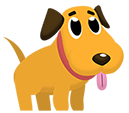A recent piece of research has thrown fascinating new light on human dog communication. Scientists from America and across Europe collaborated to analyze the interaction between dogs and humans in 190 social media videos. All of the videos were described in their titles as containing either play, hugging or petting, and they were chosen by …
How To Help A Nervous Dog Relax
Understanding how to help a nervous dog relax can transform your relationship. It’s normal for dogs with occasionally feel nervous of something unfamiliar, or that they’ve had a negative encounter with in the past. In fact, an appropriate level of nervousness has an important survival purpose. But sometimes doggy nerves can escalate, get out of …
Why Do Puppies Hump?
Why do puppies hump you, their toys, the furniture, each other, and all kinds of other things besides? Humping and mounting behavior is a normal part of growing up for lots of young dogs. There are lots of reasons for it, and in most cases it is not a cause for concern. There are also …
What Is The Best Time To Walk A Dog?
What is the best time to walk a dog in order to gain maximum benefit? Many dogs are more settled at home if they start the day with a walk in the morning. Most dogs need at least one more walk later in the day too. Dog walks should always be timed to avoid hot …
What Is A Companion Dog?
What is a companion dog compared to a service dog or an emotional support dog? The term “companion dog” is another way to describe a pet dog. A dog is a companion dog if they are kept by their human family simply for the joy that they bring. In other words, they don’t earn their …
Why Do Puppies Wake So Early In The Morning?
Why do puppies wake so early in the morning? Puppies often wake early in the morning because they need something, or something has disturbed them. They might also have learned a habit of expecting food very early in the day. Luckily there are lots of ways puppy owners can lay the groundwork for more civilized …






